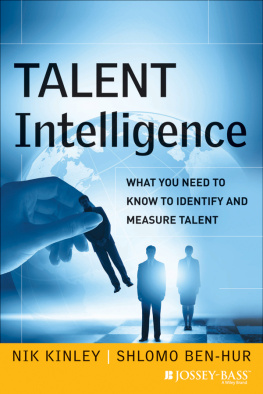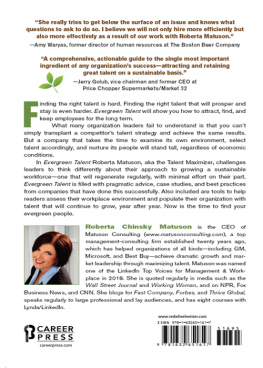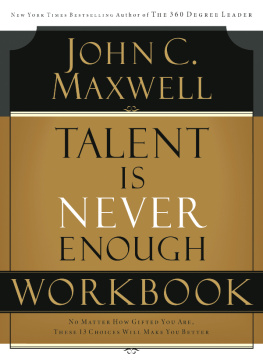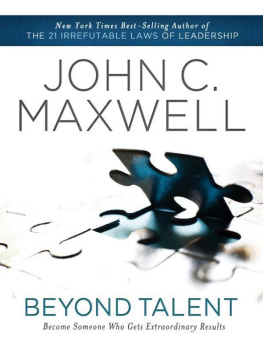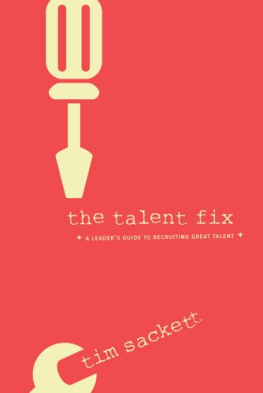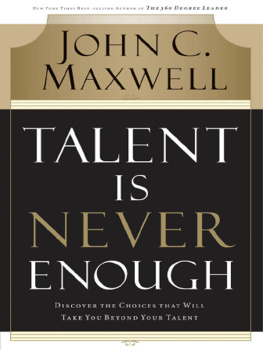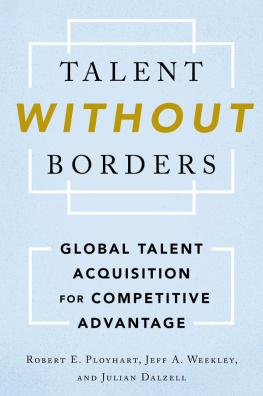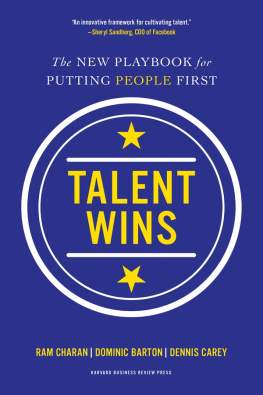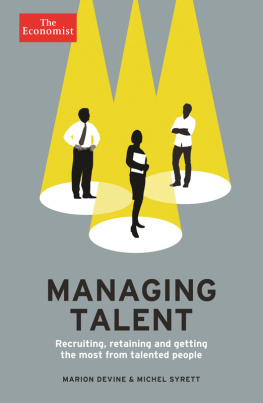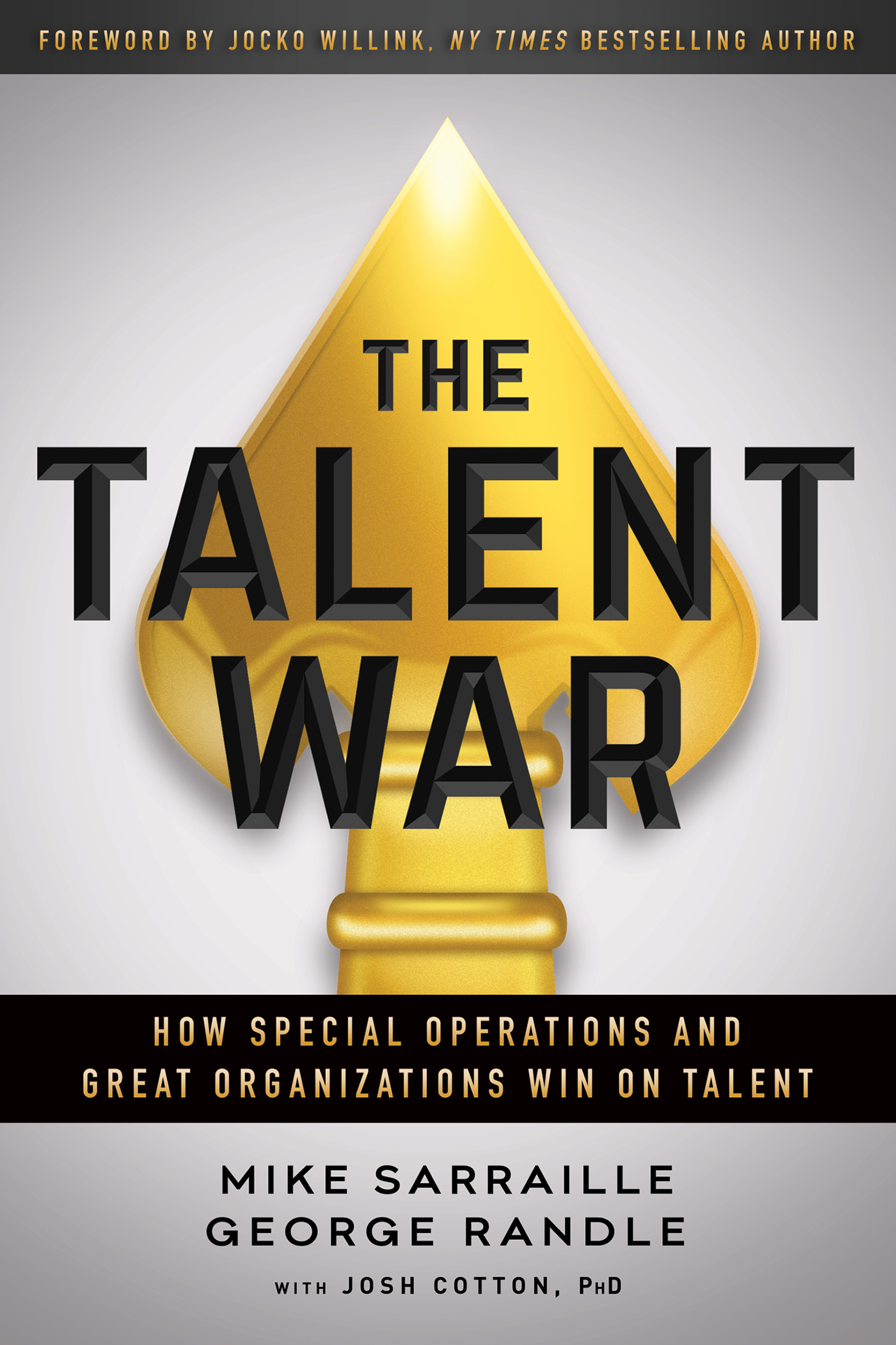
How Special Operations and Great Organizations Win on Talent
MIKE Sarraille
& George Randle
with Josh Cotton, P h D

Copyright 2020 Mike Sarraille & George Randle
All rights reserved.
The Talent War
How Special Operations and Great Organizations Win on Talent
isbn 978-1-5445-1557-1 Hardcover
isbn 978-1-5445-1556-4 Paperback
isbn 978-1-5445-1558-8 Audiobook
isbn 978-1-5445-1555-7 Ebook
The views expressed in this publication are those of the authors and do not necessarily reflect the official policy or position of the Department of Defense or the us government. The public release clearance of this publication by the Department of Defense does not imply Department of Defense endorsement or factual accuracy of the material.
This book is dedicated to our families, friends, and a long list of military and business mentors who have helped shape and support us throughout our lives and careers.
More importantly, this is for those who have served, those who continue to serve, and those who have paid the ultimate sacrifice to protect our nation and our freedoms. You set the example for all Americans, and the business world has much to learn from you.
We will not forget. We will not fail you.
The Talent War is hard. There is no manual to follow. And there is no such thing as flawless execution in this endless fight. But with a few key principles and strategies, you can win this war and lead your organization to victory.
Both of us have dedicated our lives to talent acquisition and talent management in one form or another, and weve humbly and often embarrassingly made every mistake along the way. We know most military and business leaders probably share the same sentiments and same scars. This book is drawn from the many battles we have both won and lost during this war for talent.
Of eight hundred ceo s polled in 2019, the overwhelming majority of ceo s cited the ability to attract and retain quality workers as their top concern. If you asked our senior military leaders in the Special Operations community, they would echo this same sentiment. Its all about talent.
A companys dedication and commitment to fighting the war for talent is often the determining factor of success or failure, regardless of industry or domain. The only way to win is through trial and error, constant innovation, adaptation, and improvement of your talent acquisition and talent management procedures. There is no end state, no end to this war, just a steadfast commitment to engage in the fight every day, as the survival of your organization depends on it.
The Special Operations community has morphed into a world-class case study in talent acquisition and talent management. Its no surprise why the business world has developed a fascination with Special Operations Forces ( sof ) and their ability to build winning teamsteams that often go against a numerically superior force yet find a way to achieve victory. sof has become one of the most effective, innovative, and adaptive organizations in the world. They have effectively become a talent magnet. Even so, they will admit they still get it wrong from time to time. What makes them stand apart is their constant evolution in their assessment and selection processes and their absolute refusal to accept mediocracy among their ranks.
We wrote this book because we believe the business world can learn a great deal from how sof assesses and selects talent. We hope that business and hr leaders can utilize some of the principles used by sof to strengthen their hiring practices. If we can prevent you from making the same mistakes weve made by honing your talent mindset and reevaluating your hiring practices, then we will consider this book a huge success.
Lastly, we want to highlight that we have taken every measure to protect the security of our brave Special Operations soldiers. This book was reviewed and approved for release in cooperation with the Defense Office of Prepublication and Security Review ( dopsr ). For this reason, you will notice that we do not delve into specifics about sof tactics, procedures, or any other sensitive material. Instead, we focus on the high-level strategy that drives the sof mindset toward talent. We do not feel as if this diminishes the book in any way, as it is the strategy and not the individual tactics that has truly led Special Operations to become one of the worlds greatest incubators of talent. Throughout the book, we also share personal stories, including a few of our own embarrassing stories, and we have changed some names and details for the sake of privacy.
by Jocko Willink
Leadership is the most important thing on the battlefieldand the most important thing in business and in life. It is leadership that sets the example, it is leadership that makes decisions, it is leadership that unifies a team around a common goal, and it is leadership that takes care of the team and gets the mission done.
But one of the most important roles of a leader is often overlookedthe responsibility of building the team in the first place. The leader is responsible for training, equipping, and directing a teambut before any of that is possible, the leader must recruit, screen, and acquire the right people for the team.
Like many other leadership principles I followed in my career, I learned about the responsibility of a leader to build their team from the book About Face , by Colonel David Hackworth. Colonel Hackworth was a deeply respected soldier, battlefield commissioned during the Korean War, and decorated for valor time and time again. When he took over the 4th Battalion 39th Infantry Regiment (4/39th) in Vietnam, he had his work cut out for him. The 4/39th was known in Vietnam as the Hardluck Battalion. They had a reputation not only for lacking discipline but also for suffering extensive casualties while rarely ever doing any damage to the enemy. Hackworth was personally selected to take over the battalion and fix it. And that is exactly what he did. He turned the Hardluck into Hardcore.
But he didnt do it by himself. He brought the right people on boardhe assembled a supporting cast of leaders that he knew would help him transform the battalion. Hackworth handpicked his battalion operations officer, who he had served with in the Tiger Force of the 1/327th and whose judgment and capabilities he respected. His Command Sergeant Major, Bob Press, was an outstanding enlisted leader who had served alongside Hackworth as a senior first sergeant at the 1/101st; Hackworth brought him on board to serve as the senior enlisted man of the 4/39th. Hackworth recruited Captain Dennis Foley to command Dagger Company; they had both also served in the Tiger Force with the 1/327th. He also recruited and brought over James Mukoyama, who Hackworth had known from his stint running a training battalion at Fort Lewis to be a company commander in the 4/39th.


